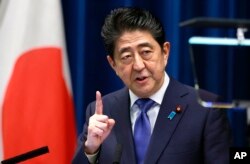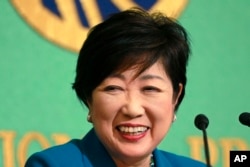The emergence of a new conservative-leaning Japanese political party is presenting an unexpected challenge to Prime Minster Shinzo Abe’s ruling coalition in the snap election he recently scheduled to extend his hold on power.
In late September, the prime minister dissolved the lower house of the Japanese parliament, known as the Diet, and called what is known as a snap election for Oct. 22, more than a year before the next election is scheduled to take place. If Abe’s Liberal Democratic Party (LDP) maintains its majority in the Diet, he could serve as prime minster until 2021.
In calling for an early election, Abe sought to take advantage of his near 50 percent support in recent public opinion polls for taking a hard line against the North Korean nuclear and missile threats. Just a few months ago, his rating was mired in the low 30s because of domestic scandals alleging he used his office to help friends and family profit, charges that he denied.
Abe also seemingly made the political calculation that in a time of rising public support for stronger national defense, his conservative coalition would easily defeat the Democratic Party, the main liberal opposition that has opposed his government’s efforts to strengthen the Japanese military through reinterpreting and altering the constraints imposed by the country’s pacifist constitution.
Party of Hope
However the recent formation of a new conservative party, called Kibo no To (Party of Hope) led by popular Tokyo Gov. Yuriko Koike, a former Minister of Defense, may present a stronger challenge to Abe than anticipated.
“I don’t know that he is in trouble, but it certainly got a lot more interesting,” said security analyst Grant Newsham, with the Forum for Strategic Studies in Tokyo.
The Party of Hope labels itself a reformist conservative party that supports a strong national defense and the close military alliance with the Untied States, but does not align with Abe’s controversial efforts to change Article 9 of the constitution that prohibits Japan from going to war to settle international disputes.
“It is almost an abnormal obsession by Mr. Abe. And I don’t think Ms. Koike shares that feeling. I don’t think that she would actually squander valuable political capital trying to change the constitution when really all you need to do is reinterpret it,” Newsham said.
The Japanese public has been sharply divided over this issue with supporters of the pacifist constitution arguing it could entangle Japan in international conflicts, most likely in support of its U.S. military ally. U.S. President Donald Trump’s recent threat to destroy North Korea if attacked and the escalating war of words between the leaders of the U.S. and North Korea, have heightened these concerns for many.
Many Abe supporters view the post World War II constitution as a humiliation imposed by the United States after Japan’s defeat in 1945. Constitutional reform advocates argue the Japanese military needs more latitude to counter increasing threats from North Korea and China. The U.S. also supports Japan taking a more prominent role in maintaining regional security.
Shifting landscape
Koike’s party could cut into Abe’s support in parliament by drawing in disaffected conservatives from both Abe’s party and the opposition. If the ruling coalition holds onto power but loses its current two-thirds supermajority in parliament, Abe’s political future could still be in jeopardy.
“If he loses the supermajority he has, it is even possible to conceive a scenario in which he would be forced to bow out coming from an internal pressure of the ruling party,” said political analyst Koichi Nakano with Sophia University in Tokyo.
In a Kyodo News agency poll this week, 46 percent of respondents said they did not support Abe’s administration, while 40 percent expressed support.
However the Tokyo governor said Tuesday she would not resign from office to run for parliament. There are concerns that not having the popular leader in the race could hurt her party’s prospects.
The Kyodo poll said 24 percent of respondents plan to vote for the ruling LDP while 14 percent plan to vote for the Party of Hope.
Also this week the liberal wing of the opposition Democratic Party split to form the Constitutional Democratic Party of Japan.
Voter backlash possible
Abe, who has been in power for five years, could also face voter backlash for being perceived as a political opportunist, in scheduling an early election while Japan is facing an increasing security threat from North Korea.
On two recent occasions Pyongyang fired missiles over the northern island of Hokkaido and has threatened to “sink” Japan into the sea. North Korea is considering testing a hydrogen bomb in the Pacific Ocean. Analysts say such a test would likely be a nuclear tipped missile launch that would also fly over Japanese airspace.






